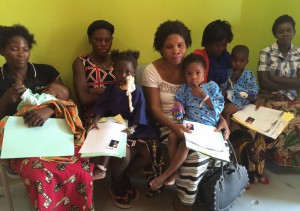The air is hot and thick in the makeshift waiting room at Beit CURE Hospital of Zambia, a pediatric teaching hospital specializing in the treatment and care of children living with physical disabilities. There is standing room only in a crowded area where mothers wait with patience for their children to be taken to the OR for surgery. Some have walked great distances with their babies strapped to their backs while others have traveled hundreds of miles by bus.
They hear about Surgicorps through a pipeline of sources; some learn by word of mouth or through a chance radio broadcast. CURE’s staff spreads the word and reaches out as far as Zambia’s Copperbelt (hours away) to provide impoverished villagers with the opportunity for life-changing surgery. Many have waited an entire year for the Surgicorps doctors to return and perform a second and even third surgery. In a country where tribal medicine and natural healing with herbs is still practiced, some of the parents have stepped away from their cultural realm and comfort zone to seek help, out of sheer desperation.
Three operating rooms provide a wide scope of surgeries. Frequently seen in developing countries are children born with extra digits, who come to have extra fingers and toes removed. Because of the use of open flames for cooking, severe burns are also customary in the rural areas of Zambia. Some children suffer from limbs that have literally melted together from burns and undergo surgery to release the contracture, followed by skin grafts. Webbed fingers are separated, cleft lips and palates are repaired, and sometimes an unexpected injury can arrive that will startle even the most seasoned medical professionals. Such was the case with a 3-month-old infant whose young mother brought him in without his left foot and with his bone exposed. The severe injury was presumably caused from a snakebite that went untreated.
There is a common thread amongst these modest, polite, and humble people. They are kind and gentle souls whose love and devotion to their children is palpable. They are unentitled and accepting of all outcomes, even when learning that surgery might not provide the miracle that they had hoped for. They are never with anger, and always with a thank you and gratefulness.
It is in the patient ward that we are able to experience the true essence of these religious and joyful people. They have appreciation for the smallest of things; a new stuffed toy, a sundress, a coloring book with crayons, or a simple bottle of nail polish. For many, their hospital stay is seen as good fortune, mostly because they are assured three meals a day for themselves and for their other children in tow. Although shared, they have a clean bed, an indoor bathroom, and a running shower. There is a sisterhood established amongst them, even those who have met for the first time. We observed each other with a sense of wonder and with admiration.
In our final hour, this group of magnificent mothers joined together and sang for us. They sang in their native language and brought each and every one of us to tears. Through song, they thanked us for changing the lives of their children. Through song, they blessed us, and they blessed our children. They thanked us for giving them back their dignity. It was with pure joy that we basked in the warmth and gratefulness of these beautiful people. We left the Beit CURE Hospital of Zambia knowing that their lives had been changed, that their lives had been bettered because of us. What they didn’t know was how much they had changed our lives. What they didn’t know was that we left wishing that we were a little bit more like them.


